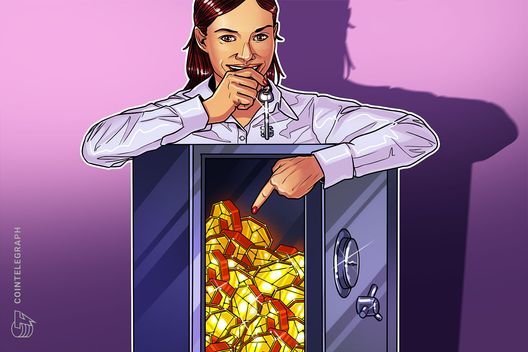Welcome to The Protocol, CoinDesk's weekly wrap-up of the most important stories in cryptocurrency tech development. I'm Margaux Nijkerk, CoinDesk’s Tech & Protocols reporter.
In this issue:
- Ethereum Validator Exit Queue Tops $2B as Stakers Rush to Quit After 160% Rally
- Jito Launches BAM to Reshape Solana’s Blockspace Economy
- Ethereum Validators Signal Intention of Upping Gas Limit to 45M
- Dogecoin Could Soon Verify ZK Proofs Natively, Thanks to DogeOS Push
Network news
VALIDATOR EXIT QUEUE ON ETHEREUM BACKS UP: Ethereum’s validator exit queue posted its longest wait time on record, a possible signal stakers are looking to pull funds after a major price rally in ether (ETH). As of Wednesday 09:00 UTC, nearly 625,000 ETH worth about $2.3 billion was in line to exit the network, data from validatorqueue.com shows. That's even larger than the amount waiting during the January 2024 spike, extending withdrawal delays to over 10 days, the data shows. The congestion is due to the dynamics of Ethereum’s proof-of-stake model, which limits how quickly validators can join or leave the network. Validators are entities that stake tokens to help secure the blockchain in return for a reward. The exodus is likely due to profit-taking by those who staked ETH when the price was much lower and are now cashing out after it's rallied 160% from an early April trough. "When prices go up, people unstake and sell to lock in profits," said Andy Cronk, co-founder of staking service provider Figment. "We've seen this pattern for retail and institutional levels through many cycles." Unstaking spikes can also occur when large institutions move custodians or change their wallet tech, he said. — Krisztian Sandor Read more.
JITO LAUNCHES BLOCK ASSEMBLY MARKETPLACE: The Jito Foundation introduced the Block Assembly Marketplace (BAM), a system aimed at improving how blocks are built and transactions sequenced on the Solana blockchain. BAM is designed to make “transaction sequencing transparent and verifiable,” while enabling programmable innovation at the blockspace layer, unlocking new revenue opportunities for developers and reducing the harmful effects of Maximal Extractable Value (MEV). The launch builds on Jito’s established infrastructure, including its widely adopted validator client, and the Jito Block Engine. BAM introduces a modular architecture with three key components. BAM Nodes are specialized schedulers that privately organize transactions using secure hardware. BAM Validators run the updated Jito-Solana software client and receive the ordered transactions from the nodes and execute them on-chain. Finally, Plugins will offer developers, traders and applications a programmable interface to interact with the scheduler, enabling customized transaction logic. According to the team, BAM will start up on mainnet in the coming weeks with an initial set of validators led by key Solana ecosystem participants such as Figment, Helius, SOL Strategies and Triton One. — Margaux Nijkerk Read more.
ETHEREUM VALIDATORS BEGIN TO UP THE GAS LIMIT: According to the dashboard gaslimit.pics, as of July 21, 49% of validators' staked ETH indicate that they are in favor of increasing the gas limit to reach 45 million units. On Ethereum, gas is the unit that measures the computational work required to execute transactions or smart contracts. Whenever a user interacts with the blockchain, they must pay a gas fee, which covers the cost of using Ethereum’s computing resources. This ensures users pay in proportion to the complexity of their actions. Each block on Ethereum has a gas limit, which is the maximum amount of gas that can be consumed by all transactions in that block. If the total gas needed by pending transactions exceeds the block’s limit, some transactions are postponed to future blocks. Because space is limited, transactions compete for inclusion, and those offering higher fees are more likely to be included first. The gas limit was last raised in February, when it was set to 36 million. That was the first time since 2021 that it had been increased, after more than half of the validators on the network supported the change, without needing a hard fork. — Margaux Nijkerk Read more.
ZK PROOFS ON DOGECOIN?: Dogecoin might’ve started as a joke, but this upgrade isn’t one. DogeOS, the app layer developed by the MyDoge wallet team, submitted a formal proposal to Dogecoin Core introducing a new opcode to enable the network to verify zero-knowledge proofs (ZKPs) natively. Developers aim to transform an unused part of the script system into a tool that can verify cryptographic proofs, starting with ‘Groth16’ (a specific type of proof widely used in ZK systems) and allowing for future upgrades. This would enable Dogecoin to support more advanced, off-chain applications, such as rollups and smart contracts, while maintaining the main chain's speed and simplicity. The approach is modular by design because proof systems are mode-selectable, and the opcode behavior is strictly opt-in. If the proof verifies, the script proceeds; if not, it fails. Old nodes remain compatible, treating the opcode as a no-op. No surprise forks, no VM bloat. — Shaurya Malwa Read more.
In Other News
- Polymarket, the cryptocurrency-powered prediction market that recently attained a billion-dollar valuation, is deciding whether to introduce its own customized stablecoin or accept a revenue- sharing deal with Circle based on the amount of USDC held on the platform, according to a person familiar with the plans. Polymarket’s motivation to create its own stablecoin is simply to own the yield-generating reserves that back the large amount of Circle’s USDC dollar-pegged token used to make bets on the popular betting platform, the person said. A Polymarket representative said no decision has been made. — Ian Allison Read more.
- SharpLink Gaming (SBET), the ether (ETH) treasury company led by Ethereum co-founder Joseph Lubin, continued its buying spree, bringing total holdings above $1.3 billion. The firm said in a Tuesday press release that it bought 79,949 ETH over the last week at an average price of $3,238, its largest weekly purchase. With the latest acquisition, the firm held 360,807 ETH as of July 20, worth roughly $1.33 billion at current prices. The company still has $96.6 million of funds raised by selling shares through its at-the-market equity for more ETH purchases, the company said. — Kristzian Sandor Read more.
Regulatory and Policy
- President Donald Trump fulfilled part of his vow to establish U.S. crypto regulations, signing legislation into law that formally established rules for stablecoin issuers — marking a first step that the digital assets industry hopes will end with the more important regulatory regime governing the wider crypto markets. Before a crowd of crypto executives in the East Room of the White House, a jubilant Trump signed the Guiding and Establishing National Innovation for U.S. Stablecoins (GENIUS) Act, which registered a massive 308-122 bipartisan vote in the House of Representatives on Thursday and an earlier 68-30 vote in the Senate — demonstrating a huge margin of support from Democrats.Trump walked into the packed room to be met by applauding lawmakers and industry leaders, including Coinbase's Brian Armstrong, Tether's Paolo Ardoino, Circle's Jeremy Allaire, Gemini's Cameron and Tyler Winklevoss, Kraken's Dave Ripley, Chainlink's Sergey Nazarov and others. — Jesse Hamilton & Nikilesh De Read more.
- The U.S. Senate is marching on in its effort to craft rules and regulations for the vast majority of the crypto market, releasing a discussion draft of a market structure bill that more clearly defines some of the frameworks the lawmakers are contemplating. The 35-page draft released Tuesday formulates new definitions for digital assets that are not securities, and directs the Securities and Exchange Commission to engage in rulemaking around these assets that would exempt them and their issuers from existing regulations. The bill later directs the SEC and Commodity Futures Trading Commission to engage in joint rulemaking around certain aspects of crypto market activity, such as portfolio margining. — Nikilesh De Read more.
Calendar
- Sept. 22-28: Korea Blockchain Week, Seoul
- Oct. 1-2: Token2049, Singapore
- Oct. 13-15: Digital Asset Summit, London
- Oct. 16-17: European Blockchain Convention, Barcelona
- Nov. 17-22: Devconnect, Buenos Aires
- Dec. 11-13: Solana Breakpoint, Abu Dhabi
- Feb. 10-12, 2026: Consensus, Hong Kong
- May 5-7, 2026: Consensus, Miami

 1 month ago
74
1 month ago
74








 English (US) ·
English (US) ·